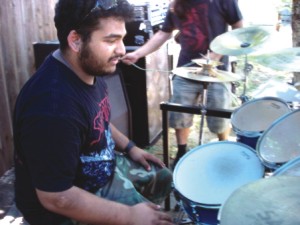|
Perceptions
Yes We Are Different
Faezan Hussain
 Growing up in the nineties and during the new millennium is a whole lot different from growing up during the Cold War, Vietnam, or Bangadesh's War of Independence. Second generation Bangladeshi Americans have grown up during the boom of technology where the majority of people have computers, cell phones, and some sort of tool for communicating to each other. Growing up in the nineties and during the new millennium is a whole lot different from growing up during the Cold War, Vietnam, or Bangadesh's War of Independence. Second generation Bangladeshi Americans have grown up during the boom of technology where the majority of people have computers, cell phones, and some sort of tool for communicating to each other.
Immigrant parents of these Bangladeshi Americans meanwhile hold on to their roots and nostalgia, often gathering at the home of a fellow Bangladeshi acquaintance or friend to watch the weekly or sometimes monthly television on a Bangladeshi channel or listen to a radio show perhaps on BBC Bangla Service. Short attention spans, a common ailment for us young people, was something they never heard of.
Our parents had many dreams. To be a pilot, scientist, or world traveller, often they just remained that, a dream. Reality took over and dreams were pushed aside to do whatever it took to maintain the family. For us the younger generation, it is so much easier than our folks, but we have other tough issues to deal with that many Bangladeshi youth living in Bangladesh might not have to worry about.
Since some of us are growing up in the United States, we are stuck in the middle of tradition and the land of opportunity. A lot of us wish to make our parents happy by following in their footsteps, but we also want to take advantage of the land in which we live in. The goals of our parents were to come to settle in other countries and to be successful in starting families. They wanted to remain anonymous and live life like any other citizen. As their children, we are taken up by the fact that we can do anything if we set our mind to it and we thrive on being different. Our parents' dreams of their sons and daughters becoming doctors or lawyers fade away as we make our own choices getting into film and music production, law enforcement and the military, or just becoming the everyday average Joe.
What may not be looked upon as a highly respectable position in another country, may make you "somebody" in America. That is what America thrives on, because it is the land of opportunity and everybody has to work to live. Everybody has to make their own living and the majority of people don't ask for help for little things. We do our own laundry, drive our own cars, prepare our own food, and do every other little thing possible ourselves.
That's the one thing that makes us young people and our Bangladeshi parents come together. We do things on our own, which I have not seen very much of in Dhaka. Our parents raised us by themselves and cared for us while they worked all day trying to pay the bills, bring food to the table and keep a roof over our heads. Just as many villagers in small towns of Bangladesh have done and continue to do so.
The main differences we face with our parents are the ways we treat and understand people, the music we listen to, food we eat, and our view on life.
The younger generation is usually more open-minded then their predecessors and see things beyond the surface. We tend to put ourselves in others' shoes and view things that way. Our parents are usually biased and only believe in what they have learned from when they were younger. They usually believe in stereotypes while we understand why there are stereotypes.
The music gap between us is also very huge. For some of us, it's the heavily distorted guitars strumming and fast beating drums with hellish dog snarls and pig growls, and for others its mainstream pop music with pretty boys that only look good. For our parents, it's the folk or classical music or old modern songs, music that reminds them of the good times they had when they were younger. While some of our music sounds like incantations of the devil, it's really not that and we enjoy it. The music just makes us feel comfortable so, don't judge people from what they listen to.
Another major difference is the food we eat. Our parents are hung up on their deshi food - dal, bhat, bhorta etc. We on the other hand like the occasional byriani or paratha kabab but for everyday meals we prefer sandwiches, cereal, fruit, and barbequed meat. Burgers and pizza is not the typical food we eat on a daily basis, but we do enjoy it. There's more. A lot of us don't like spicing all our food up so it reminds us of Bengali food. We can't wake up and have eggs, rice, beef and bread from the previous night's dinner. We try to keep it simple. We don't like oily foods for every meal and we can't have rice everyday either. A lot of us younger people like to stay healthy and don't enjoy that too full feeling after every meal, every single day.
The way some of us view life is to just do what makes us happy. We don't want to just contribute to how the world already is and maintain it with its mediocrity. We have dreams and we intend on fulfilling them, just as our parents had. The goal, is really not that different. Like them we plan on doing what we always wanted to and live a happy, constructive life.
Copyright
(R) thedailystar.net 2007 |
